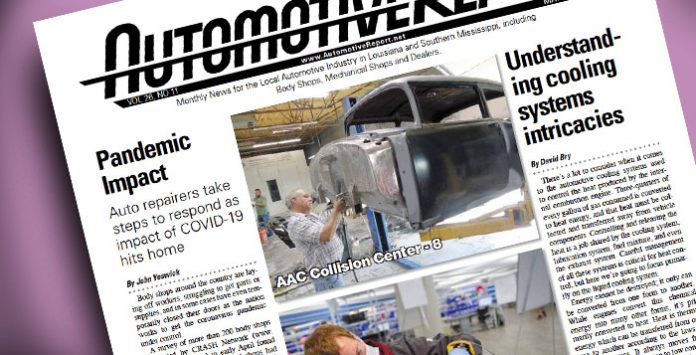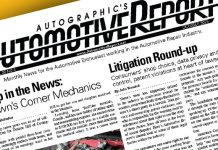Collision repairers take steps to respond as impact of COVID-19 hits home
By John Yoswick
Body shops around the country are laying off workers, struggling to get parts or supplies, and in some cases have even temporarily closed their doors as the nation works to get the coronavirus pandemic under control.
A survey of more than 200 body shops conducted by CRASH Network (www.CrashNetwork.com) in early April found that more than 91 percent of shops had seen a decline in walk-in traffic for estimates; almost three in five (57 percent) had customers postpone scheduled jobs; nearly half (48 percent) were reporting increased difficulty in getting parts or supplies; and almost one-third (30 percent) had laid-off employees. A half-dozen of the shops said they had chosen to temporarily close down their business while monitoring the situation.
“We closed [in late March] for two weeks and sent 17 employees home with advanced pay,” Adam Reiter of Golden’s Paint and Body Shop in Hot Springs, Ark., said, adding that he thinks if more of the country had shut down earlier the pandemic would have been more quickly contained.
Many other shops when asked what they were doing in response to the situation pointed to increased efforts to let drivers know they were open for business.
“We’re enhancing our online and social media marketing to encourage customers to get any overdue or older collision damage taken care of more quickly now due to shops having plenty of capacity and while they won’t need their vehicles as much,” Eric McKenzie director of body shop operations for the Park Place Dealerships in Texas said.
Ron Perretta, owner of Professional Auto Body in Duncansville, Pa., distributed a press release announcing discounts he is offering (including at his tire and mechanical business) to all “frontline workers” such as those providing medical, grocery, delivery or emergency services.
Frank Rinaudo said Frank’s Accurate Body Shop in Slidell, La., said his company trying to help other businesses in the community as part of the shop’s marketing.
“We have paired up with a local radio station to give out gift cards we purchased from local restaurants,” Rinaudo said. “In return for us donating the gift cards, the station is giving us free recognition.”
Unfortunately such efforts to reach consumers could be undermined if policyholders are hearing a different message from insurers.
“Insurance companies are telling customers to wait a few weeks if their car is drivable because of parts [issues] and because shops are closing,” Steve Hardee, owner of Collision Specialists in Jackson, Tenn., said.
One shop had set up an outdoor office reception area to reduce traffic in the office, and a Missouri shop has asked customers to “call in, and we will go out to write an estimate.”
“We put a sign on the front door to blow horn we will come out to get information for estimates,” Glenn Grey of Grey’s Auto Collision in Hiram, Ga., said.
“We posted on social media that we will gladly do email estimates to the customer, with no need to enter the building, just call from the parking lot,” Illinois shop owner Candace Dietzen of The Body Shop of Barrington, said.
Shops also naturally reported increased efforts to clean the shop, customer areas and vehicles. Gigi Walker, a shop owner in the San Francisco Bay Area, said she her shop for some time has worked to sanitize the interior of every vehicle, particularly the driver’s area and all door handles, as soon as a vehicle is dropped off. If a surface won’t be damaged, she said, they use a solution of bleach and warm water. They also have squirt bottles of 60 percent rubbing alcohol and water.
“We saturate a rag and wipe the steering wheel, turn signals, brake and gear handles, exterior handles,” Walker said. “We wipe the dash and interior windows, because when people drive, they sneeze and cough, right?”
Walker’s shop works on public service vehicles, including ambulances and sheriffs’ cars, so it has extended what it does to sanitize those vehicles to all customer vehicles that come into the shop. Walker also has given hand sanitizer to all employees for their personal vehicles, and put it around the shop for employees to use after working on one vehicle before moving on to the next.
The surveys found little consistency in whether insurance companies were paying for that extra labor and materials shops are investing in to clean vehicles. Nationwide Insurance in April sent a memo to its direct repair shops, saying it would pay for one labor hour and $25 in materials for this “without a requirement for additional documentation.” But other insurers appear to have taken a different tact.
“American Family is the only company in our area refusing any payment,” a Nebraska shop owner wrote.
“Everyone but Geico has agreed to pay something,” an estimator at a shop in Seattle said
“Geico has refused to pay, saying it is not part of the loss,” a Vermont shop owner wrote. “We are putting together the information from our Governor that [justifies] that [such safety steps] are required for us to stay open.”
Among the most common challenges cited in terms of getting parts and supplies were closed dealerships, cut-backs on deliveries, and shortage of cleaning supplies and personal protective equipment.
“We are having trouble getting dust masks for our body techs,” a shop in Texas reported. “No one has any in stock.”
“Unable to obtain paint respirator masks,” Jon Eaves, body shop manager at Dutch Miller of Charlotte in North Carolina, wrote.
McKenzie of the Park Place Dealerships said they were finding it tougher to get “additional office disinfecting supplies, since we are cleaning common areas much more frequently,” and Chris Hedrick, general manager of Statesville Collision Center in Statesville, Ga., said the shop’s jobber “notified us this morning…they will cut back to a four-day work week.”
Shops are scaling back, too.
“Nineteen employees furloughed for 60 days,” Dominic Martino of Gold Coast Auto Body in Chicago said.
One Colorado shop said in addition to layoffs, some employees have volunteered to take time off without pay to assist others that need to work. Another shop, in Southern California, has cut its remaining staff to 30 work hours a week.
Many shops also said they are seeking federal government disaster assistance funding.
“Applying for SBA loans to hopefully survive the state-imposed shut-down,” Steve Bachorski of Countryside Customs in Warrenville, Ill., said.
Others are finding ways to make the best of the slow-down in business activity.
“Doing some online training to use the time to sharpen business skills,” Bob Gibson of Total Auto Body in Grafton, Wisc., wrote.
“Made sure all employees have properly set up I-CAR and training accounts, and am setting up employee reviews,” Justin Club, manager of Deery Collision Center in Burlington, Iowa, said.
Shops hoping for some help through a “business interruption” claim on their garagekeeper’s insurance policy are probably out of luck. Most such policies require “direct physical loss of, or damage to, property” at your premises, Philadelphia attorney Randy Maniloff points out. He said most policies since 2006 have included an exclusion for “loss or damage caused by or resulting from any virus, bacterium or other microorganism that induces, or is capable of inducing, physical distress, illness or disease.”
But as economic losses mount, lawmakers may intervene. Eighteen members of Congress signed a letter asking major insurer trade groups to recognize COVID-19 as being included under business interruption policies. And legislatures in at least four states are considering bills would force business interruption policies — even those with a virus exclusion — to provide coverage for the coronavirus-caused disruptions at least for small businesses.
Despite the hardships, many shops cited steps they are taking to help their community. Mike Lichtenberg of Mike’s AutoCrafts in Montgomery City, Mo., said the shop “donated all the N95 masks we could spare to a local doctor’s office,” one of about a dozen shops in the survey reporting similar donations to local medical facilities. •
John Yoswick, a freelance writer based in Portland, Ore., who has been writing about the automotive industry since 1988, is also the editor of the weekly CRASH Network bulletin (www.CrashNetwork.com). He can be contacted by email at john@CrashNetwork.com



